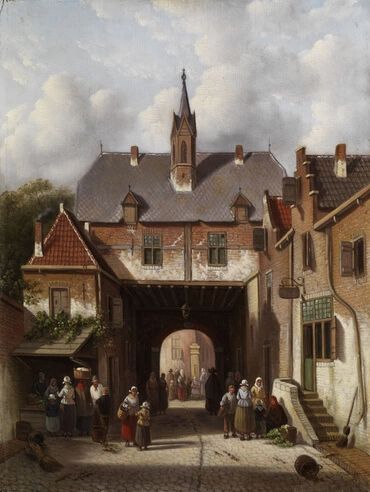Gate

Gates" in ancient times had a significance that does not hold in the modern world. Cities then were enclosed by walls for protection; gates in the walls let people in and out to do their business, but were also the weak points in the cities' defenses. In the Bible, cities on one level represent the minds of individual people. On a broader level, they represent beliefs shared by a community. The gates, then, represent openings where the Lord can feed us an understanding of truth and a desire for good. They also represent points where the hells can invade and sway us with false ideas and evil desires. We are kept in balance during our lifetimes, with influences from both the Lord and from hell. Ideally, we will over our lifetimes continue to invite the Lord farther and farther in and drive the hells back until ultimately the Lord can occupy our minds completely. And that point our belief in Him and His power and love will hold the gates and deny evil any entrance. As individuals, we at that point become angels. As communities, we at that point become part of the Lord's church. And at that point the gates become an entry point, introductory truths that allow people to enter churches and start bringing the Lord into their lives.
Arcana Coelestia#627
627. 'For all flesh had corrupted its way upon the earth 1 ' means that man's bodily-mindedness destroyed all understanding of truth. This is clear from the meaning of 'flesh', dealt with already at verse 3, as in general the whole of mankind, and in particular the bodily-minded man, or everything of a bodily nature; and from the meaning of 'way' as the understanding of truth, or truth itself. The fact that 'way' has reference to the understanding of truth, or to truth itself, becomes clear from the examples already quoted in several places as well as from the following,
Jehovah said, Get up, go down quickly from here, for your people have corrupted themselves. They have suddenly turned aside from the way which I commanded them. They have cast for themselves a metal image. Deuteronomy 9:11, 16.
This means that they forsook His commandments, which are truths.
[2] In Jeremiah,
Whose eyes have been opened upon all the ways of the sons of man, giving to every man (vir) according to his ways and according to the fruit of his works. Jeremiah 32:19.
'Ways' means life according to the commandments, 'fruit of his works' life based on charity. 'Way' accordingly has reference to truths, which comprise commandments and ordinances, and so do 'son of man' and 'man' (vir), as shown above. Jeremiah 7:3; 17:10, also contain similar usages.
In Hosea,
I will visit upon him his ways, and require him for his works. Hosea 4:9.
In Zechariah,
Return from your evil ways and from your evil works. As Jehovah Zebaoth thought to deal with us for our ways and for our works. Zechariah 1:4, 6.
Similar phrases appear here, yet they are the contrary in meaning to those mentioned before them, since they are 'evil ways' and 'evil works'.
In Jeremiah,
I will give them one heart and one way. Jeremiah 32:39.
'Heart' stands for goods, 'way' for truths. In David,
Make me understand the way of Your commandments. Take from me the way of untruth, and graciously grant me Your law. I have chosen the way of truth. I will run in the way of Your precepts. Psalms 119:26-27, 29-30, 32, 35.
Here 'the way of the commandments and precepts' is called 'the way of truth', and the contrary of this, 'the way of untruth'.
[3] In the same author,
Make Your ways known to me, O Jehovah, teach me Your paths, guide my way in Your truth, and teach me. Psalms 25:4-5.
This in like manner plainly stands for the truth. In Isaiah,
With whom did Jehovah consult, and he instructed Him, and taught Him the path of judgement, and taught Him knowledge, and made Him know the way of understanding? Isaiah 40:14.
This plainly stands for an understanding of truth. In Jeremiah,
Thus said Jehovah, Stand upon the highways and look, and ask concerning the paths of old, which is the good way, and go in it. Jeremiah 6:16.
This in like manner stands for an understanding of truth. In Isaiah,
I will lead the blind in a way they do not know; and in paths they do not know I will guide them. Isaiah 42:16.
The expressions way, by-path, pathway, road, and street all have reference to truths because they lead to what is true, as also in Jeremiah,
They have caused them to stumble in their ways, in the pathways of old, going into by-paths and not the highway. Jeremiah 18:15.
Similarly in the Book of Judges,
In the days of Jael pathways ceased to be. And those who went along the paths kept to twisting pathways; the streets in Israel ceased to be. Judges 5:6-7.
脚注:
1. or the land






